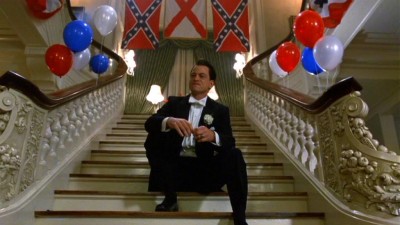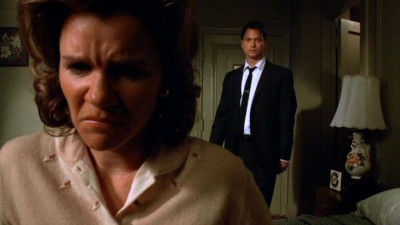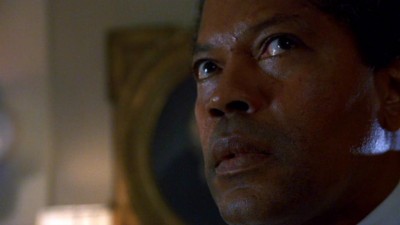| Reviews & Columns |
|
Reviews DVD TV on DVD Blu-ray 4K UHD International DVDs In Theaters Reviews by Studio Video Games Features Collector Series DVDs Easter Egg Database Interviews DVD Talk Radio Feature Articles Columns Anime Talk DVD Savant Horror DVDs The M.O.D. Squad Art House HD Talk Silent DVD
|
DVD Talk Forum |
|
|
| Resources |
|
DVD Price Search Customer Service #'s RCE Info Links |
|
Columns
|
|
|
George Wallace (Special Edition)
Warner Bros., no doubt hoping to cash in on the upcoming inauguration publicity, is releasing on the same day, a two-disc "special edition" of George Wallace, the 1997 TNT "docudrama" starring Gary Sinise and Angelina Jolie, and directed by John Frankenheimer. A powerfully shot but frequently uneven exploration of the complex, hated/redeemed Southern populist/segregationist, George Wallace sports a knockout performance by Gary Sinise (and a rather erotic one by Angeline Jolie), but numerous historical inventions in the script - along with the director's and screenwriters' refusal to take some kind of stand on Wallace's actions and motivations - results in a less-than-satisfying melodrama.

Structured as a flashback after Wallace's near-fatal assassination attempt in 1972 cost him a possible White House win, as well as resulting in his total paralysis from the waist down, George Wallace opens with the events of that day, before it goes back to 1955, where campaign manager Wallace celebrates the win of "Big" Jim Folsom to the governorship of Alabama. Folsom, a liberal Democrat who felt that government was there to help all of the people - including African-Americans - acknowledges that Wallace will seek to succeed him as Governor, and that he will aid Wallace in every way he can...as long as Wallace remembers to represent all of the people, even if he has to break with the will of the majority for their own good. Wallace reassures Folsom that he'll stay true to his mentor's views. This willingness to embrace integration riles the powerful forces of segregation in Alabama - particularly the Klan - resulting in Wallace denouncing the terrorist group, which promptly costs him the 1958 election. Trouble arises on the domestic front when his incredibly loyal wife, Lurleen (Mare Winningham), tired of his affairs and unable to sustain a marriage where George is constantly away from his home and family, vows to leave him for good, until Wallace convinces her that he needs more than just a quiet homelife, and promising her she'll be a bigger part of his campaigning. Vowing to never be "out-niggered" again by opponents that play the race-card, Wallace embraces the politics of bigotry and segregation, and begins his remarkable ascension to power, eventually winning the governorship in 1962, where in 1963, he gave his infamous inaugural address where he vowed, "I say segregation today, segregation tomorrow, segregation forever."
After provoking a nationally televised showdown with the Kennedy administration when he made his infamous "Stand in the Schoolhouse" on June 1, 1963 (where Wallace symbolically tried to stop the enrollment of two black students to the University of Alabama), Wallace's national political career was launched. Wallace's contact with African-Americans (at least in the film) is limited to his interaction with the largely silent "Archie," (Clarence Williams III) a prison trustee who becomes Wallace's valet. Well aware of the effects that Wallace's politics have had on the black community, Archie quietly seethes with fury (he almost goes ahead with murdering the governor) while he tries to come to grips with his own conflicting view of Wallace, as filtered through his religious teachings. The civil rights showdowns in Alabama and elsewhere in the south continue, while Wallace becomes more and more a national figure, indicating his intention to run for President in 1964. After this failed bid (where Wallace racked up impressive support), he engineers his wife's campaign to succeed him as governor (Alabama's law restricted Wallace from two consecutive terms). She wins quite handily, but dies in office from cancer, during Wallace's 1968 third party run for President (where he again saw sizeable national support). Reconnecting with Cornelia Ellis Snively (Angelina Jolie), whom Wallace knew as a child (she was the niece of "Big" Jim Folsom) in 1970, Wallace marries the vivacious beauty, and helps him campaign for the 1972 Presidential election, which appeared to swing Wallace's way until an assassin's bullet paralyzed Wallace and effectively ended his Presidential hopes. Suffering horribly from his wounds (Wallace never knew another day without crippling pain), Wallace's marriage also suffers, and he divorces Cornelia. Wracked with pain and newly humbled by his circumstances, the film offers that Wallace "changed" his ways and asked forgiveness of the black community for his past political actions, finishing out his days being cared for by Archie.

I'm well aware of the realities of the "docudrama" genre, particularly as it's practiced on TV; to cut to the quick: stuff gets made up. Any historical event is subject to condensing of characters, the telescoping of timelines, and outright invention to symbolize a complex idea that doesn't lend itself to concrete filming. It's a fairly accepted practice in such films, a practice which annoys the hell out of historians and which can leave audiences with false information and impressionsions about historical events. But as Frankenheimer often said, movies aren't documentaries. They're dramas, and therefore, they don't have to be strictly factual (unless someone called Frankenheimer on this, and he retaliated by saying he was artistically expressing "the truth," without admitting it was just his truth). Point taken. But there are significant alterations and inventions in George Wallace that are at best problematic from a historical viewpoint, and questionable from an artistic one. At the beginning and end of George Wallace, there are text disclaimers that essential convey this message: pretty much anything could be up for grabs in this biopic of the complex Wallace. Quite specifically, the final disclaimer states that the main character of prison trustee "Archie" is a total fabrication, representative, rather remarkably, of the entire range of emotions experienced by the black community during Wallace's lifetime ("remarkably" in that any one fictional creation could possibly, accurately "sum up" or "represent" such an incredibly varied set of human responses).
The biggest problem I had with the "Archie" character is that he occupies such a central place in the story, an important character who has specific, integral plot points that anyone watching the film (and not really paying attention to the disclaimers - particularly at the end credits when most TV viewers run out of the room) would think are historically "true." Frankenheimer and his screenwriters Paul Monash and Marshall Frady weave Archie throughout the narrative, providing the film with the only significant black presence, and in the process (largely through the performance of Williams III) creating a powerful character...only for him to turn out to be a total fabrication when one reads the end credit disclaimer. Knowing this does negate to a degree the impact of those previous scenes, while setting up doubt in the viewer's mind as to what is true or not in George Wallace. Regardless of Frankenheimer's intention to summarize the entire black community's feelings about Wallace in one largely silent character (there's room for a lot of discussion right there with that design), his and the screenwriters' either refusal or inability to fashion a historically accurate take on Wallace's political and personal relationships with African-Americans (obviously one of the most critical aspects of his personality) without resorting to inventing an all-purpose suffering victim/potentially avenging angel, ultimately calls into question their efforts to tell Wallace's story with any degree of historical accuracy or artistic "truth." When a director has to bookend a film with disclaimers essentially explaining his artistic metaphors, either the structure of the film is flawed to begin with, or the director and screenwriters weren't able to transcend the problem of historical accuracy married to an aesthetic vision.
Other small details are fudged or outright invented in George Wallace: the two black students were already set up in their rooms during Wallace's symbolic "Standing in the School Door" event, not standing with the National Guardsmen as Frankenheimer has them; Wallace was actually politely received by a well-mannered group of young men at Harvard in 1964, unlike Frankenheimer's unruly mob screaming insults and profanity at him; and Wallace was not booed at the 1972 convention - small details that add up to a historical viewpoint that needs to be taken with a grain of salt. Certainly the other big fib in George Wallace - and a highly problematic one - is Frankenheimer's staging of Wallace's supposedly spontaneous idea to enter Martin Luther King's old church in Montgomery, in 1974, and tearfully ask for forgiveness from the black community for his sins against them. According to several sources, this didn't happen. Wallace had been invited to speak at the church, was welcomed right off the bat, and he spoke of his past actions in terms of states right versus the abuses of an increasingly powerful federal government - not in terms of personal redemption or the need to be forgiven by the black community. He did indeed apologize later to many of his political enemies, as well as to the black community in general, but it didn't happen the way Frankenheimer stages it.

This invention, although certainly dramatically satisfying (it puts a coda on the film), winds up being a rather facile facade for a far more difficult assessment of Wallace's actions and motivations - a task Frankenheimer and the screenwriters seem resolutely unwilling to tackle. In an archival interview with Frankenheimer that's incorporated in the featurette included on this DVD, the director says he left the issue open as to whether or not Wallace was redeemed. However, the real "up in the air" quality of George Wallace is who George Wallace really was, and why did he do the things he did. Scholars have debated whether or not Wallace was truly a bigot or a political opportunist (or both), but George Wallace refuses to take a stand. Some call this kind of fence-sitting "honest," but considering the outright invention and shaping that went into the fictionalized aspects of the script (in the service of presenting a "greater truth" as they claimed), neither the director nor the scriptwriters can then claim "objectivity" when it comes to the really tough issues - specifically: what motivated Wallace - that they refuse to illuminate. Frankenheimer clearly has a story arc in mind: Wallace is an early liberal Democrat who plays the race card to start winning elections, only to realize too late what his polices have done when he himself begins to suffer on a scale with his black constituents. It's a clean line of dramatic reasoning, but looked at objectively, outside the genuinely effective performances and the strengths of Frankenheimer's visual design, it's a relatively simplistic approach to a political operator that historians seem to agree was an unusually complex, conflicted, and politically gifted individual.
Why does Frankenheimer leave out Wallace's early career, where he was considered one of the most liberal judges Alabama ever had up to that point - including in his treatment of blacks? Wouldn't a few more scenes of Wallace inhabiting this first aspect of his political career make his later transformation into a segregationist that much more powerful? And why does Frankenheimer leave out much of Wallace's later life, where he became a born-again Christian aiming to right the wrongs he perpetrated as governor? Why does Frankenheimer just go straight to the "bad stuff," and leave out much of what made Wallace interesting in the first place - his conflicted, contrary behavior? Frankenheimer claimed he wanted to show Wallace's conversion as a story of hope (the redemption of an unrepentant Democrat racist certainly would appeal to a hard-line liberal like Frankenheimer), but he fobs this off by showing Wallace being charming with his wife, or suffering the indignities of his injuries - all easy stuff, dramatically. The really hard scenes that might have given some insight into Wallace's true motivations, Frankenheimer avoids like the plague. Perhaps Frankenheimer didn't really believe in Wallace's conversion, after all (the film never mentions that Wallace was "born again," nor would die-hard secularist Frankenheimer likely cotton to an examination of that process, anyway). Maybe he just wanted to show all the harm that Wallace caused (and Wallace did indeed cause great suffering for southern blacks by example and through his policies), avoiding any real complexities in the man that would necessitate more difficult scripting than what shows up here in George Wallace. Fair enough. But then don't try and turn the film into some kind of faux-"well rounded" portrait of the man with facile "humanizing" scenes of him being impotent and having a phoney black servant who turns from almost killing him with an ice pick, to lovingly putting him to bed.

The DVD:
The Video:
The anamorphically enhanced, 1.85:1 widescreen video transfer for George Wallace looks spectacularly good, with absolutely no compression issues, and a beautifully saturated, correctly valued color image, with pinpoint sharpness and just a hint of grain. Frankenheimer really makes this TV movie look like something for the big screen. The film is split into two parts - one on each disc - which eliminates any compression isssues.
The Audio:
The Dolby Digital English 2.0 stereo mix is nicely balanced, with all dialogue cleanly rendered, with discreet directional effects. English subtitles are included, along with Portuguese and Thai.
The Extras:
There's a new featurette, Vision and Conflict: Collaborating on the Wallace Saga, running 20:32, which features selections of an archival interview with Frankenheimer, as well as new interviews with Sinise, Jolie, and Mare Winningham discussing the project. It's fairly puffy in content.
Final Thoughts:
There's no denying that Sinise, Jolie, Winningham and Thomas are compelling in their performances here in the TV biopic/docudrama George Wallace. However, director John Frankenheimer avoids exploring the truly problematic aspects of the Southern segregationist's motives and actions, and goes with the easier dramatic highlights of Wallace's romantic travails and the aftereffects of his assassination attempt. Frankenheimer's stated goal of not "judging" Wallace only applies to his "born-again" conversion - a subject Frankenheimer clearly isn't interested in, anyway. Superficially powerful (due most to the performances and to Frankenheimer's always interesting visual design), but ultimately pretty hazy when it comes to pinning down bigot-or-opportunist (or both) Wallace, George Wallace is worth a rental if you like the stars or if you're a student of that period, but that's all.
Paul Mavis is an internationally published film and television historian, a member of the Online Film Critics Society, and the author of The Espionage Filmography.


|
| Popular Reviews |
| Sponsored Links |
|
|
| Sponsored Links |
|
|
| Release List | Reviews | Shop | Newsletter | Forum | DVD Giveaways | Blu-Ray | Advertise |
|
Copyright 2024 DVDTalk.com All Rights Reserved. Legal Info, Privacy Policy, Terms of Use,
Manage Preferences,
Your Privacy Choices | |||||||















